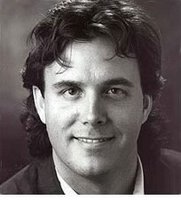One of the loveliest port cities on the eastern seaboard, Charleston, SC is overtaken for seventeen days in the late spring by the
Spoleto Festival USA. Under the stewardship of Nigel Redden, executive producer of the Lincoln Center Festival and former executive director of the Santa Fe Opera, Spoleto is nirvana for arts lovers of all ilks, with, according to the program book, “over 120 performances by renowned artists as well as emerging performers in disciplines ranging from opera, theater, music theater, dance, and chamber, symphonic, choral, and jazz music, as well as the visual arts.”

I paid my visit this past Sunday for a remarkable performance by the Spoleto Festival Orchestra, led by composer/conductor
John Kennedy. I had never had the privilege of meeting John until about two hours before this concert. He is a handsome, youthful (read: my age), and charismatic conductor.
The concert was one of the sixty bazillion in honor of the 250th anniversary of Mozart’s birth, but the programming was quirky, to say the least, with two pieces by Michael Nyman, works by Alfred Schnittke and Alexander Raskatov, and one piece by an American composer: me. Oh, and there was a work by that Mozart guy as well – the program concluded with his astonishing
Masonic Funeral Music, K. 477.The first Nyman piece was one of his earliest works,
In Re Don Giovanni from 1977, before he found success as a film composer. Arranged for string quartet, this three-minute piece is a great example of how old radicalisms can come to seem tame: surely in 1977 it would have been extraordinary to hear a serious composer writing pseudo-Mozart, but now the music just seems a bit flimsy.
The other Nyman piece, which had the privilege – or curse -- of preceding the Mozart on the program, was both brilliant and frustratingly foolish. Entitled
Mozart on Mortality, it was a setting for soprano, two clarinets and three strings of a segment from one of the composer’s letters, in which he reflects on the nature of his relationship with death. The concept of the piece was lovely: Nyman’s stylish pop sound crossed with a slightly askew Classicism matched up with the words very effectively. But the instrumentation was pure film score, in the worst sense. The balances between the voice and instruments, and among the instruments themselves, were impossible – the strings may as well have not been there, you simply couldn’t hear them. In a scoring studio, of course, the sound could have been mixed in such a way that everything could come through clearly, but in the real world, it was embarrassing. The performers tried to compensate by amplifying the soprano, necessary for the most part because of the low tessitura of much of the vocal writing. They succeeded in making the voice audible over the clarinets, which it wouldn’t have been otherwise. But it was frustrating nonetheless, since a well-conceived scoring could have been truly powerful.
The Schnittke offering was
Moz-Art, a violin duo that seemed to have all of the composer’s trademark non sequiturs. New to me was the music of Alexander Raskatov, who was represented by his
Five Minutes from the Life of WAM, the most recent piece on the program. A brief concertino for violin and large chamber ensemble,
5:00 is very attractive, with Mozartean phrases concluding in wistful glissandos and delicate strokes of wind chimes.
My piece was
Amadeus ex machina from 2001, which has surprised me with all of the performances it's received – even before the Mozart anniversary came along. It’s one of my more exuberantly scatterbrained pieces (in effect, not compositionally), covering a lot of ground in ten minutes. It does what I was hoping it would do very well – and I have moved on to other things. These days I’m feeling more inclined to focus, rather than head in so many directions.
As I said earlier, the program was quirky – but it wasn’t quirky because of the mix of old and new. The wide-ranging mix of performing forces was far more surprising. I don’t think I will ever again hear
Amadeus ex machina, which is an orchestra piece, preceded on a program by a duo for two violins -- and yet it worked beautifully. Changeovers from piece to piece were handled with a minimum of fuss. The order of the program, from a table-setting opener through a range of highs and lows to the solemnity of the concluding works, was immensely satisfying. And finishing with the
Masonic Funeral Music was an inspired touch – the piece is truly extraordinary.
The whole concert was just an hour long, without intermission. My piece, at ten minutes, was the longest.
The performance, incidentally, was quite good – far better than some performances I’ve heard in which the musicians had more time to learn their notes. The Spoleto Festival Orchestra is made up of young musicians from the top grad programs around the country, some just out of school. They didn’t have the mutual familiarity one finds in professional orchestras with long-tenured musicians, but they made up for it in the intensity of their involvement in the music-making. Kennedy had them very well prepared for their evening’s work. And the acoustics in the hall – Grace Episcopal Church -- were very generous. I was surprised at how well I could hear everything.
The sizable crowd, comprised of people who traveled here from all over, was very appreciative and seemingly quite knowledgeable.
Sadly, I was unable to stick around for any of the other 119 performances going on. We got our quick stroll around the docks – hadn’t been there in fifteen years -- and hopped back in the car for the five-hour drive home.



